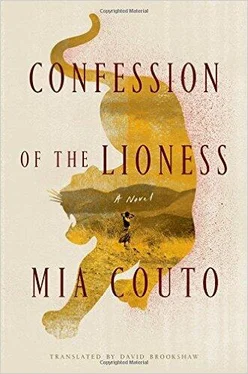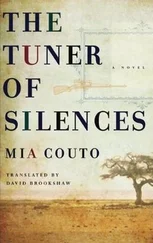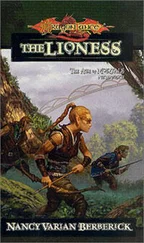You’re only asking, Mariamar, because you’re scared I’ll kill your little huntsman. It’s not me you want to protect.
Don’t go, I beg you.
I have to go. I can’t turn back. Those men have already paid me.
He turned around and walked away, dragging his feet as if reluctant. He paused to look at the trunk of the tamarind tree. It was I who broke the silence:
I was so sad when that tree died.
Then my father told me: When I got sick in my legs, it was my mother who cured me. It wasn’t the mission, it wasn’t Father Amoroso. My mother performed takatuka on me. She transferred my pain to that tree, which afterward couldn’t stand the burden and withered away. That’s what takatuka consists of: to switch someone’s illness to something. That’s what happened with me: Hanifa Assulua swapped my soul’s injuries for the life of that tamarind. That’s what my father told me as he said goodbye.
The Hunter’s Diary: FIVE. The Living Bone of a Dead Hyena
An army of sheep led by a lion is capable of defeating an army of lions led by a sheep.
— AFRICAN PROVERB
The administrator is impatient. “Operation Lion,” as he now calls the hunt, is taking time to produce results. In the meantime, he has received an ultimatum from his superiors in the party. Outside investment in the region could be at risk if this area of tension is not resolved.
I even thought of drafting a report, saying everything was all right.
A false report?
It’s what we subalterns do. We never say there’s a problem. If we admit there’s a problem, then that only brings more problems from our superiors. But Naftalinda read the report and threatened to expose its falseness publicly. So that’s why there’s only one solution, my dear huntsman: Hurry up and kill these lions for me.
Not long after Florindo has left, there’s a knock on the door from his well-endowed wife, Naftalinda. She asks whether the administrator has been here. Then she calls me over and whispers in my ear:
Florindo’s in a hurry. He wants the matter brought to a conclusion. He’s ordered arms to be distributed among the others. Be careful, my friend. There are people here who want to kill you.
That same afternoon, I set off alone. I make for the forests that line the road leading to Palma. I have a hunch that my walk may prove productive.
* * *
My hunch is proved right. After half an hour, the outline of a lioness emerges on the other side of a dried-up stream. The animal doesn’t seem surprised, as if she were expecting this encounter. Without any warning, she lunges forward on the attack and in a split second covers the distance that separates us. More unexpected than the lioness’s charge is my own shriek:
God help me!
That frenzied invocation is all I have left as the trigger awaits the pressure of my finger. What curse is it that weighs upon me as I commend my soul instead of firing a shot? Within me, my mother’s prophecy and my father’s inheritance vie with each other.
But lo and behold, suddenly the lioness stops her onward rush. Who knows, maybe she is surprised not to see me run away, terrified. She stops in front of me, her eyes fixed on mine. She is puzzled by me. I’m not what she expected. At that same moment, she ceases to be a lioness. When she withdraws, she has already left her existence. She is no longer even a living creature.
* * *
I arrive at our encampment in such a state of defeat and emptiness that I lie down on the veranda, prepared to sleep out in the open. I had the lioness in my sights and I failed like a novice, seized by fear. I don’t deserve a roof over my head. Maybe the gods will find it easier to forgive me if I am modest and unprotected like this.
I’m not one of those people who seek help from the heavens when they are afflicted. As for praying, I only pray when I’m asleep. My dreams are my only prayers. I hope God doesn’t take this badly. But it’s just that all I have left is a tiny, temporary soul. Only at night does my spirit come alive, whispering softly so that no one may hear me. I ask for forgiveness for my descent into animality. But having a soul is a burden that I would only be able to bear when dead. That’s why I loved so much, in so many deluded love affairs. That’s why I hunt. To empty myself. To free myself from being a man.
* * *
The perfect opportunity, missed through my own fault, remains an obsession in my memory. The lioness continues before me, appraising my soul. There is a divine light in her eyes. I am beset by the strangest of thoughts: that somewhere, I have already contemplated those eyes that seem capable of hypnotizing a blind man.
A gentle weariness enfeebles my body; I’m assailed by the same anguish that causes moths to flutter helplessly around the oil lamp. I fall asleep. And I dream. I’m the opposite of the traditional hunter who, the night before, dreams of the animal he’s going to kill. In my case, I dream of myself, gaining life only after having been killed by the creatures of the wild. These beasts are now my private monsters, my favorite works of creation. They will never cease to be mine, never stop moving through my dreams. Because I am, after all, their docile prisoner.
* * *
Kulumani’s old church emerges in my dream. When I open its rust-hinged doors, I come face-to-face with a white priest. He is Portuguese, his face is familiar. It’s hard to imagine his being a priest. His disheveled hair, his torn, dirty cassock, lend him the appearance of a beggar.
Come in, my son , he invites me. My flock has been fervently awaiting you for so long. Archangel is your name and it was God who sent you.
My eyes get used to the shadows: Those whom the priest calls his flock of believers are, in fact, lions and lionesses. These felines are sitting respectfully, listening with human devotion to the message that the priest is propagating from the pulpit. And together, priest and believers pray that I may be successful in my mission: that I may put an end to the brutalities of men who are pursuing innocent lions. The priest raises the chalice: This is your blood , he proclaims. Struggling to control themselves, the lions cover the church pews with their saliva. His arms outstretched, his voice battling in order not to be drowned by the roars of the wild animals, the missionary announces:
You haven’t come to kill a lion. You’ve come to kill a person!
* * *
What a hell of a dream, I think as I awaken. I tell the writer about the ghosts that torment me at night. Gustavo smiles and remarks: It’s curious how we always dream of the same animals: lions, tigers, eagles, serpents. Deep down, we want to be those that can devour us.
* * *
First thing in the morning, accompanied by the writer and by the tracker Mpepe, I set off for the arid wastelands that lie to the north of the village. The lions were prowling around there last night. I was confident that it would be easy to follow them: Over the wide area of sand, lions leave perfectly distinguishable tracks. This whole territory is called Kuva Vila. And it’s true: In Shimakonde, the term means “empty.” The place is deserted, godforsaken. It is said that not a drop of rain has ever fallen there, even in distraction.
We haven’t been going for long before we catch sight of a solitary hyena in the distance. It walks along like a mirage against the indistinct background of the sand. The writer has difficulty in picking out the animal. Then, when he glimpses the prey, his face is lit with the incandescence of a moment, the flash of his senses. Afterward I explain to him: This is the real nature of my vice. It’s not killing that fascinates me. It’s this encounter with an elusive miracle, the fleeting and unrepeatable moment. All of a sudden I’m jolted by Genito Mpepe’s explicit order:
Читать дальше












